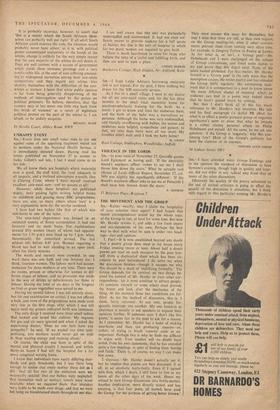THE MOVEMENT AND THE GROUP
SIR,—Rather wearily, may I claim the hospitality of your columns once again? I had hoped that recent correspondence would lay the whole topic of the Group to rest, at least for some time. But now Mr. Horder revives it, and adds a few fresh sneers and mis-statements of his own. Perhaps the best way to deal with what he says is under two head- ings--fact and opinion.
1. Fact.—lt is now established beyond any doubt that a poetry group does meet in my house every Friday evening (more or less). About half a dozen poems are read on each occasion by the poet him- self from a duplicated sheet which has been cir- culated by post beforehand. 1 do serve tea when the discussion finishes—though it escapes me why this should be a mark of 'stultifying formality.' The Group depends for its survival on two things be- yond the control of Mr. Horder or your other cor- respondents: (a) it must continue to attract people; (h) someone (myself or some other) must provide the house and look after the mechanics of the thing. At the moment these two conditions are ful- filled. As for the method of discussion, this is, think, fairly informal. At any rate, people fre- quently interrupt one another. My one function as chairman is usually to ask speakers to expand their opinions further. If someone says 'I don't like this poem,' it seems fair to the poet to ask for a reason. As I remember, Mr. Horder has a habit of making assertions and then not producing reasons—or, rather, of trying to brush 'reasons' aside as un- important. Perhaps this is why he finds me difficult to argue with. Your readers will no doubt have noted, froin his own statements, that he has attended quite a few meetings, in spite of finding them 'boring and futile.' There is, of course, no way I can make him come.
2. Opinion.—Mr. Horder doesn't actually say it, but he implies that poems are best discussed, if at all, in an alcoholic hurly-burly. Even if I agreed with him, which I don't, I still have to live in my house all the other days of the week. Hence my refusal to turn Group discussions into bottle-parties. Another implication, more directly stated, and less amusing, is that four poets, all named, have used the Group 'for the purpose of getting better known.' They must answer this sneer for themselves, but may I state that three are still, at their own rawest, on the Group mailing-list, even if other commit- ments prevent them, from coming very often (one, for example, is Gregory Fellow in Poetry at Leeds). As for what is, or isn't, a 'Group poet'—Mr. Hobsbaum and I were challenged on the subject of Group conformism, and listed some names to try and prove that this didn't exist. None of the poets named protested. For that matter, Mr. Horder himself is a 'Group poet' in the only sense that the description counts. He writes poetry and has attended the Group fairly regularly. His astonishing state- ment that it is unimportant to a poet to know about 'the many different shades of meaning' which an audience can find in a poem may indeed show that he hasn't gained much by coming.
But then I don't think all of this has much relevance to Mr. Herder's real intention. His title and his final paragraph ('a skilful PR effort for what is in effect a poetic pressure group of nugatory significance') seem to show that what he intends is a rather clumsy Personal attack on Philip Hobsbaum and myself. All the same, let me ask one question: if the Group is 'nugatory,' why this con- tinuing fuss? Most of the Group's publicity has been the clamour of its enemies.
*


































 Previous page
Previous page